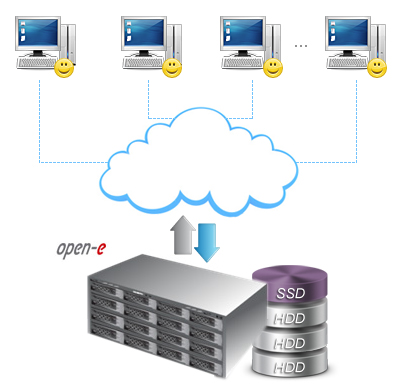How to Serve Thousands of Users Simultaneously?
For:
Open-E DSS V6
The challenges facing cloud hosting providers
Not surprisingly, cloud services are becoming increasingly popular. A significantly lower cost, the elimination of the need to invest in expensive software and hardware, and increased mobility are among the many benefits of utilizing cloud storage. Users only need an Internet connection and access to the cloud in order to capitalize on these benefits. The sudden increase in the popularity of cloud hosting creates the need to provide inexpensive, yet efficient high random IO performance.
Cloud service providers are concerned with maintaining a competitive price point for services they provide. Such companies offer inexpensive monthly subscriptions, but rely on thousands of customers to stay in business. Service providers need hundreds of TB's and excellent random IO performance in order to serve thousands of customers at the same time.
Building a cost-effective, high capacity storage appliance is possible thanks to premium SATA drives and a high capacity enclosure of up to 48 bays.
The problem with SATA drives is poor random IO performance that makes it impossible to serve thousands of users simultaneously at an acceptable performance level. The overwhelming number of users online generates 100% random IO access patterns, slowing the performance of RAID with SATA drives. The problem was described in our blog post.
What is the solution to poor random IO problems?

Faster hard disks are the solution to the problem of poor random IO. Fast 15k RPM SAS HDD show random seek time at about 3ms. Slow 7200 RPM SATA HDD show random seek time at about 9ms. So, by using fast SAS drives we can improve random performance by 3 times. This is NOT enough!
Currently SSD drives are about 10 times faster in the case of random IO performance compared to 15k SAS HDD. The only problem is the price.
In order to offer both high capacity and fast random IO and also stay within your budget, you need to consider an SSD cached SATA RAID array.
Open-E Data Storage Software V6 supports two available SSD cache solutions. The first is Adaptec maxCache which offers read and write caching and promises applications improvement of up to 13 times. The second MegaRaid CacheCade PRO from LSI offers dynamic read and write cache and significantly improved IO performance.
Benchmarks made with CacheCade, with a single SSD, show over 40.000 IOPS and with two SSD even over 80.000 IOPS (see interesting results from test 1 and test 2). This is considerably higher than a few hundred IOPS that the HDD array can perform by itself. While SSD drives have a very limited write endurance compared to regular HDD, there are SDDs that offer ultra-high endurance with even 35 full drive writes per day.
Utilizing SSDs with Open-E DSS V6 helps companies improve random IO and provide premium performance to thousands of users simultaneously.
Trademarks: The names of actual companies and products mentioned herein may be the trademarks of their respective owners.


